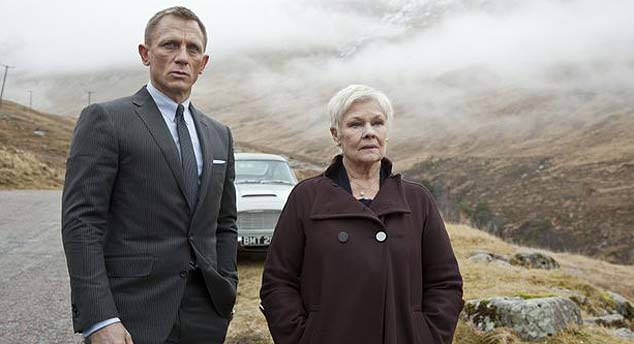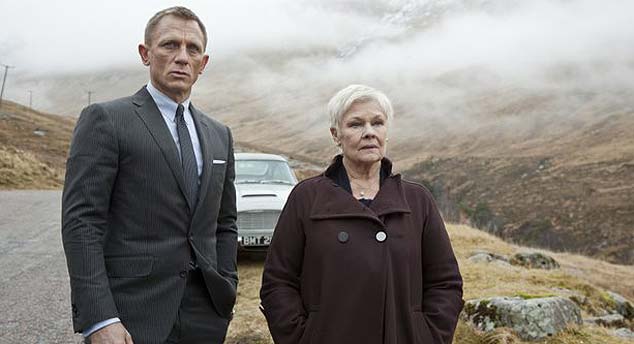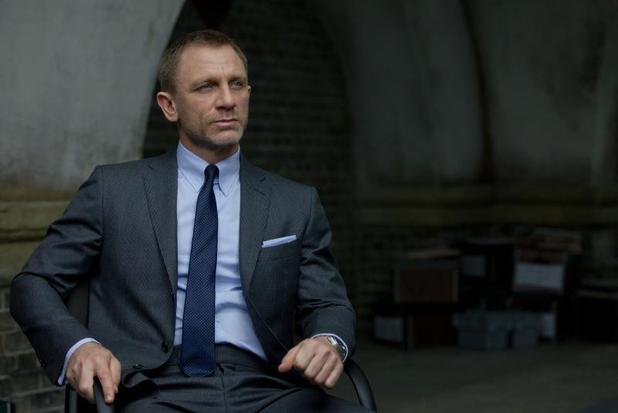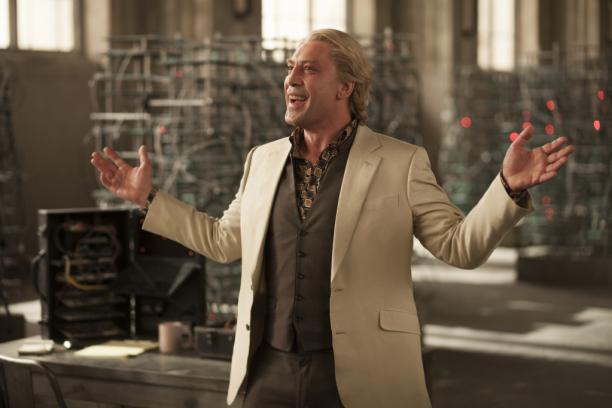Directed by Sam Mendes
Written by John Logan, Neal Purvis and Robert Wade
U.K./U.S.A., 2012
*Those sensitive to spoilers should be wary with the following article. Certain key story elements are revealed.
Time and time again the legendary James Bond film franchise has learned to adapt and survive. Survival of the fittest, if you will. Whether the reasons for concern were changes in the actor playing the part, the loss of a producer, turbulent waters for the studio’s finances, changes in screenwriters or the lack of anymore Ian Fleming material upon which new adventures can be penned, the series has always quickly learned to get back on its feet to thrill and amuse audiences the world over. Even within the films themselves, the plots have almost always reflected new geo-political paradigms, as well as cultural morays and trends in pop culture. James Bond is always recognizable, and yet he can adapt if need be. Now, 50 years after the release of the first official film, Dr. No, Skyfall is unleashed unto the world, a film that simultaneously pays tribut to the franchise, the character of Bond, creates a bold, original story and helps remind audiences that there is always a place for 007 at the theater.
Bond (Daniel Craig) and fellow field agent Eve (Naomie Harris) are in Istanbul, tracking down a cyber terrorist named Patrice (Ola Rapace) who has infiltrated the Turkish MI6 station and stolen a hard drive containing the names of several key British undercover agents. A kinetic car chase, motorcycle pursuit and fist fight atop of a train concludes with Eve misfiring her sniper riffle, hitting Bond instead of the enemy. 007 crashes into the water below, presumed dead…Shortly thereafter, a shocking terrorist attack on MI6’s London headquarters forces Bond, who had survived his near death experience and briefly adopted a hermit like existence, drinking his days away, to return home and help M (Judi Dench) finally locate Patrice and who he is ultimately working for. M herself is in enough trouble as it is due to the Istanbul disaster, her work now being monitored by a consultant from the Ministry of Defense, Gareth Mallory (Ralph Fiennes). Bond’ first stop is Shanghai, but has the accident at the start of the film slowed him down too much, both physically and mentally? Are Bond and MI6 past their prime?
Before diving into the picture’s thematic importance, some other critical issues must be addressed first. Sitting in the director’s chair for this entry is award winner Sam Mendes, which immediately added significant credibility once it was announced. Additionally, the film cinematographer is the celebrated Roger Deakins, which had the die hard and even the more casual fans salivating. Working together, the create a wonderful look to this latest Bond film, keeping much of the film just grounded enough for the places the characters visit to appear believable, while injecting each with a sense of class, a sexiness and some idiosyncratic exoticness. The casino sequence in Macao is a fine example, Mendes and Deakins shooting a gambling establishment that looks normal enough (in its own fanciful, high class way, naturally), but give the location such lighting and shadows that make it far more sinister and smokier than the audience originally anticipates. The finale, which occurs at Bond’s childhood home, the Skyfall estate in a remote part of Scotland, is drenched is a beautifully rich blue hue at one point and a fiery orange at another as the building a barrage of grenade attacks. In essence, Skyfall stands in line with some of the series’ more exquisitely shot outings like The Spy Who Loved Me, On Her Majesty’s Secret Service and Casino Royale, yet the image quality manages to surpass all of the aforementioned films. Skyfall is not just pretty to look at for its set design and costume designs, but for the pure cinematography above all else.
The ability of the fans and casual viewers alike to identify with the happenings of the Bond universe can be attributed, as has been previously stated, to the ability of the filmmakers to send 007 into an adventure that resonates with something in the real world, be it political, social or pop culture related (examples of the latter would be the many Rover Moore adventures which had the character partake in a blaxploitation-esque film, a flung fu parody and even a space adventure two years after the success of the original Star Wars). Where Skyfall plays its cards a little differently is in the way it weaves into its story the theme of James Bond. True enough, the story also harps on the relevance of spy organizations and their importance in the fight against terrorism in the early 21st century, but considering that in the world of these movies, the most important spy of them all is also the most ludicrous, it can be said that secondary theme reinforces the first one even further. It is incredibly fitting that director Mendes and his team shift their focus towards the character of Bond and him a theme unto itself given that 2012, the year the film is released, coincides with the 50th anniversary of the franchise on the big screen (just in case you did not notice). Bond seems to be on a lot of people’s minds as of late, and so what better idea to wrestle with then the very existence of the famed hero and how important he still is.
Skyfall goes about this exploration of Bond’s place in movies and the world in several ways, the most important of which are the personal fight to regain his peak physical and mental health, his relationship with M and a films mall window the viewer is given to peek into some of Bond’s past. Following the pre-title sequence, Bond is forced to recover from some terrible wounds which have slowed his reflexes and see him grow somewhat weaker as a cunning spy. This is the part of film in which protagonist must regain his place among his peers for one, and second, become as good as he ever was. It is ironic that this should be part of the plot line of the new film when considering that the studio which financed the pictures, MGM, had struggled mightily for three years between this latest entry and 2008’s Quantum of Solace. There was a point not too long ago when some could be forgiven for questioning whether there would be a new Bond film at all. Skyfall asks the question ‘Can Bond become himself again or has he reached his limit?’ It comes as no surprise when Bond does rediscover himself again and gets the upper on the story’s villain, Silva (Javier Bardem), but the film’s acceptance to take this path and explore the character in a new, compelling way is praise worthy. In the real world, Bond has been absent from the theater for four years, not to mention that the previous film was not well received, and because of that he has to ‘earn’ his place once again, it will not be handed to him. In the film, a physically and mentally scarred 007 must overcome the odds if he is to foil the villain.
Bond’s relationship with M, while touched on somewhat during the Brosnan years and the first two Daniel Craig outings, comes to the forefront in Sam Mendes’ film. Other than Moneypenny and perhaps Felix Leiter, there is no other character with whom Bond has had a consistent relationship in the series. The casting of Judi Dench has provided another dimension to that relationship as she has often come across as something of a maternal figure for 007. Never has this been played up more then in Skyfall, in which M, in many respects, becomes the Bond girl. Eve and Sévérine (Bérénice Marlohe) have their parts to play and both are quite flirtatious with Bond, yet it is clear that when the climax commences, neither holds the same importance in the story as M. While she and Bond have not always been on the best of terms, Bond recognizes everything she has done for him, from approval of his licence to kill to covering for him when both were in tight spots. The film also wisely shies away from an overdose of sappiness, which would have betrayed the tone. Nonetheless, through their quintessentially dry English mannerisms and quips can be detected a clear cut appreciation for one another, differences in opinion and methodology be damned. Here is yet another angle from which the filmmakers get to explore the character further in ways that were never really touched on before, thus further enhancing the appreciation of 007 in a year that has been all about celebrating his career in movies.
Finally, there is the exploration of James Bond’s past. ‘Exploration’ might be too strong a term, for the film only hints at the chapter of the protagonist’s life which relates to his childhood, some of which is from the Ian Fleming source material (parents perishing in a climbing accident), while other details were fabricated for dramatic effect in the film (the Skyfall estate and the existence of the caretaker, Kincade, played by Albert Finney). The important element here was to not reveal too much, which would have changed many people’s perception of the character and spoiled the mystique in many ways. By providing small droplets of information, the filmmakers humanize him just a little bit more, making him a tad more relatable all the while preserving hssis legendary aura. The decision to head into Bond’s past not only reinforces the film’s celebratory angle, but fits into the story as well. Bond’s takes the decision to bring M to the Skyfall home in Scotland because it is the the last place Silva would look, therefore buying them time before the terrorist’s inevitable arrival. The one place where Silva does not have the upper hand is also a place that directly relates to James Bond’s personal history, something most audiences know nothing about. Give them something they haven’t seen before that once again plays into the 007 anniversary all the while driving the story to its gripping conclusion.
Thankfully the film has been met with critical and financial success. It feels only natural now to expect future Bond adventures in the coming years. Aside from that however, it is the quality of the movie itself which has given the franchise a much needed shot in the arm. The ideas discussed in this article might very well have flown over most movie goers’ heads, yet they seem relevant to those who hold the series to their hearts. Skyfall is ostensibly not only a return to form of sorts but a story that reminds, reassures and reassesses how popular James Bond is in film and among the populace. It is an original adventure with some thing to say about the character: he is, has been, and hopefully will continue to be consistently present in popular culture. New trends come and go, new film techniques enhance the movie watching experience, new social morays make their way into the fabric of society, yet James Bond can always be counted on to be around because the interest is there. The more things change, even in the Bond films themselves, the more they remain the same, again, much like Bond.
-Edgar Chaput
This article is part of our 007 marathon. You can find all the entries by clicking here.






